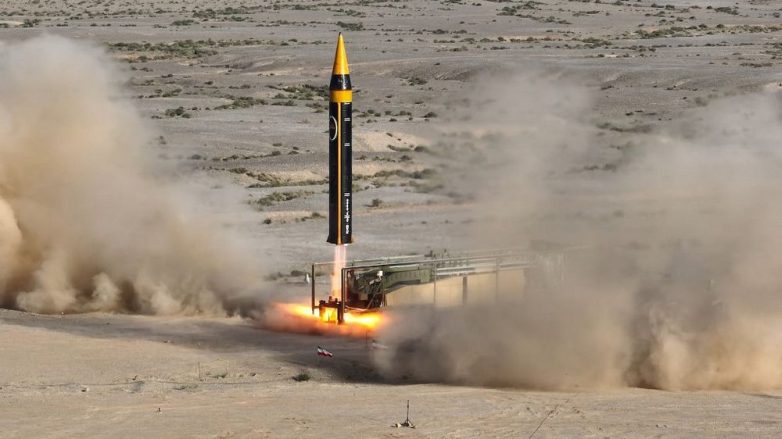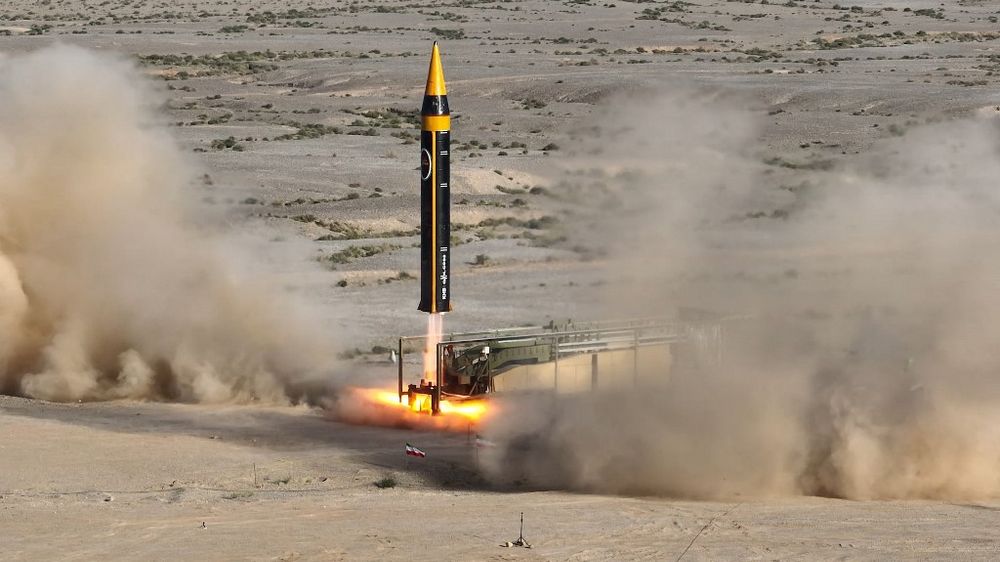
Iran’s Khaybar Missile Launch: A Game-Changer or a Provocation?
Iran missile launch, Revolutionary Guard operations, Middle East military tensions
Iran’s Khaybar Missile Launch: A New Development in Regional Tensions
In a significant development within the Middle Eastern geopolitical landscape, the Iranian Revolutionary Guard has announced the launch of the Khaybar missile, marking a pivotal moment in the ongoing tensions between Iran and Israel. This operation signifies the first time the Khaybar missile has been deployed towards what is referred to as the “occupied territories,” sparking widespread attention and concern among international observers and analysts.
The Significance of the Khaybar Missile
The Khaybar missile represents a new chapter in Iran’s military capabilities, characterized by advanced technology and precision targeting. Named after the historic battle of Khaybar, this missile is believed to be an upgraded version that enhances Iran’s deterrent power in the region. The launch is not only a demonstration of Iran’s military prowess but also serves as a warning to its adversaries, particularly Israel, regarding Tehran’s commitment to defending its interests and allies in the Middle East.
Context of the Launch
The missile launch comes at a time of heightened tensions in the region, marked by ongoing conflicts and disputes involving Iran, Israel, and various proxy groups. For years, Iran has faced accusations of supporting militant factions that threaten Israeli security, and the Khaybar missile’s deployment is seen as a direct response to these accusations. The Iranian Revolutionary Guard often conducts military exercises and tests as part of its strategy to showcase its capabilities and assert its influence.
Reactions to the Missile Launch
The international community’s reaction to the launch has been one of concern. Analysts fear that this development could further escalate tensions in an already volatile region. Israel, which has long regarded Iran’s military advancements as a significant threat, is expected to respond with increased military vigilance and possibly retaliatory measures. The U.S. and its allies have also expressed apprehension, as the launch could disrupt efforts to stabilize the region and negotiate peace agreements.
Implications for Regional Security
The successful launch of the Khaybar missile raises important questions about the future of security in the Middle East. With Iran demonstrating its ability to strike targets in the occupied territories, the balance of power in the region may shift, prompting neighboring countries to reassess their military strategies. This situation could lead to an arms race, as countries in the region may feel compelled to enhance their own military capabilities in response to Iran’s advancements.
The Role of Proxy Groups
One of the critical elements of Iran’s military strategy is its support for various proxy groups throughout the Middle East, including Hezbollah in Lebanon and various militias in Iraq and Syria. These groups often serve as extensions of Iranian military power, enabling Tehran to project influence without direct involvement. The Khaybar missile launch could embolden these groups, potentially leading to increased aggression against Israel and its allies.
Future Prospects
Looking ahead, the launch of the Khaybar missile could have far-reaching implications for diplomacy in the region. Efforts to negotiate peace and stability may be complicated by the escalating military posturing. The international community, including the United Nations, may need to play a more active role in mediating tensions and addressing the underlying issues that contribute to conflict in the region.
Conclusion
The Iranian Revolutionary Guard’s launch of the Khaybar missile is a significant event that underscores the ongoing tensions in the Middle East. As Iran continues to develop its military capabilities, the potential for conflict increases, affecting not only regional stability but also international relations. Stakeholders in the region, including Israel, the U.S., and other ally nations, will need to navigate this complex landscape carefully to avoid further escalation and work towards a more peaceful resolution.
In summary, the Khaybar missile launch represents a critical moment in the ongoing power dynamics of the Middle East, with implications that extend beyond immediate military concerns. As the situation evolves, it will be essential for analysts, policymakers, and the global community to monitor developments closely and consider the potential ramifications on regional and global security.

**Iranian Revolutionary Guard:**
The Khaybar missile was launched toward the occupied territories for the first time in this operation. pic.twitter.com/ZTh8CeS89q
— Middle East Observer (@ME_Observer_) June 22, 2025
Understanding the Iranian Revolutionary Guard’s Recent Missile Launch
In a striking move that has captured global attention, the Iranian Revolutionary Guard recently announced the launch of the Khaybar missile toward occupied territories. This missile launch marks a significant development in the ongoing tensions in the Middle East. But what does this mean for the region and beyond? Let’s dive into the implications and background of this event.
The Khaybar Missile: A Brief Overview
The Khaybar missile is a product of Iran’s expanding military capabilities. Developed by the Iranian military, this missile showcases the nation’s advancements in missile technology and serves as a demonstration of its strategic prowess. The missile is named after the historic battle of Khaybar, a significant event in Islamic history, often symbolizing resistance and strength.
According to reports, the Khaybar missile was launched for the first time during this operation, making it a notable event in Iran’s military agenda. The Iranian Revolutionary Guard, known for its assertive stance in regional conflicts, is often at the forefront of Iran’s military operations.
Context Behind the Missile Launch
The backdrop of this missile launch is steeped in a complex web of geopolitical tensions. Iran has been involved in various conflicts and power struggles across the Middle East, particularly concerning its relationships with neighboring countries and its stance towards Israel.
The phrase “occupied territories” is crucial here. It refers to regions that have been the subject of longstanding disputes, particularly between Israel and Palestine. By targeting these areas, Iran is sending a clear message of defiance against perceived aggressors and asserting its role as a key player in regional politics.
Reactions to the Missile Launch
The reaction to the Khaybar missile launch has been swift and varied. Governments around the world are closely monitoring the situation. Many Western nations have condemned the launch, fearing it could escalate tensions further in an already volatile region. For instance, the United States and its allies have expressed concerns over Iran’s missile capabilities, viewing them as a threat to regional stability.
On the other hand, Iran’s allies, such as certain factions in Iraq and Syria, may view the launch as a symbol of resistance against Western influence in the region. This dichotomy of reactions highlights the polarized nature of Middle Eastern politics, where alliances are often fluid and based on immediate strategic interests.
The Strategic Implications for Iran
For Iran, launching the Khaybar missile serves multiple strategic purposes. First, it demonstrates military strength both to domestic audiences and international observers. In a country where nationalism plays a significant role, showcasing military prowess can bolster the regime’s standing among its citizens.
Second, this missile launch sends a message to adversaries in the region, particularly Israel. By demonstrating its capability to strike occupied territories, Iran aims to deter potential military action against it. This act of defiance is meant to reassure its allies and instill fear in its enemies.
Future Developments: What to Expect
As the dust settles from this missile launch, the focus will likely shift to potential repercussions. Analysts predict that military responses could follow, either from Iran or its adversaries. Escalation of military actions in the region could lead to a cycle of retaliation, which may impact not only Middle Eastern nations but also global politics.
Moreover, diplomatic efforts to address the underlying issues may gain renewed urgency. International organizations and key global players may push for dialogue to prevent further escalation and promote peace in the region. The effectiveness of such diplomatic efforts, however, remains uncertain in the face of deep-rooted hostilities.
Public Perception and Media Coverage
The way this missile launch is portrayed in the media can significantly influence public perception. Social media platforms, in particular, play a crucial role in shaping narratives around such events. For instance, the tweet from Middle East Observer highlighting the missile launch has garnered attention, sparking discussions and debates across various platforms.
Media coverage can often reflect the biases of the outlets reporting. Some may frame the event as a legitimate act of defense, while others might depict it as an aggressive show of force. Understanding these narratives is essential for comprehending the broader implications of the missile launch.
The Broader Impact on Middle Eastern Politics
The missile launch has potential ramifications for the balance of power in the Middle East. As Iran continues to develop its military capabilities, neighboring countries may feel compelled to enhance their own defenses. This arms race could lead to an increased militarization of the region, heightening the risk of conflict.
Moreover, the launch of the Khaybar missile could influence the dynamics of ongoing conflicts in Syria, Iraq, and Yemen, where Iranian influence is already significant. The ripple effects of this event may be felt across multiple fronts, making it imperative for regional players to reassess their strategies moving forward.
Conclusion: A New Chapter in Regional Tensions
The launch of the Khaybar missile by the Iranian Revolutionary Guard marks a pivotal moment in Middle Eastern politics. As the situation continues to unfold, the international community will be watching closely, and the potential for escalation remains high. Understanding the motivations and implications of such actions is crucial for anyone interested in the geopolitical landscape of the region.
In a world where information travels rapidly, staying informed about developments like this missile launch can help shape our understanding of complex international relations. Whether you’re a casual observer or deeply invested in global politics, the events unfolding in the Middle East will undoubtedly continue to influence our world.
“`
This HTML article is structured to be SEO-optimized, utilizing relevant keywords and ensuring a conversational tone while providing comprehensive information on the topic.
**Iranian Revolutionary Guard:** The Khaybar missile was launched toward the occupied territories for the first time in this operation.